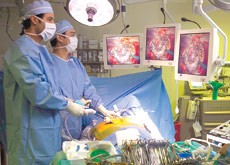
The specialty of urologic oncology in this country began at Memorial Sloan Kettering under the leadership of Dr. Willet Whitmore Jr. Through his superb surgical skills, his brilliant understanding of the biology and natural history of genitourinary cancers, and his remarkable teaching ability, Dr. Whitmore attracted many leading young urologists to train as fellows at Memorial Hospital.
Former Fellows
These former fellows presently constitute the majority of academic urologic oncologists in North America and include many world-renowned leaders in the field:
- Dr. James Montie, Professor and Chair of Urology, University of Michigan
- Dr. Paul Schellhammer, Professor and Program Director of the Virginia Prostate Center, Eastern Virginia Medical School
- Dr. Mohamed A. Ghoneim, Founder and Director, Urology and Nephrology Center, Mansoura University (Mansoura, Egypt)
- Dr. Peter Carroll, Professor and Chair of Urology, University of California, San Francisco
- Dr. Ian Thompson, Professor of Surgery and Chief of Urology, University of Texas Health Science Center at San Antonio
- Dr. Joseph Smith, Jr., Professor and Chair of Urologic Surgery, Vanderbilt University School of Medicine
- Dr. Neil Bander, Director, Urological Oncology Research, Weill Medical College of Cornell University
- Dr. Yves Fradet, Professor of Urology and Chair of Surgery, University Laval, Quebec
- Dr. Eric Klein, Head of Urologic Oncology, Glickman Urological Institute of The Cleveland Clinic
- Dr. Laurence Klotz, Professor of Surgery and Chief of Urology, Sunnybrook & Women’s College Health Sciences Centre, University of Toronto
Faculty
Fellows have the opportunity to train alongside MSK’s Urology Service. The service is part of a team that was ranked #1 for Urology Cancer Care this year by U.S. News & World Report.
Over the past five years the Urology Service has grown from seven to 17 faculty members. The core faculty of urologic cancer surgeons is now complemented by experts in medical informatics, urodynamics, reconstructive surgery, erectile dysfunction, tumor markers, and laparoscopic surgery. The academic focus of the faculty is on specific cancer sites — prostate, testis, bladder, or kidney. Working in disease management teams with experts in medical oncology, radiotherapy, pathology, radiology, and basic science, fellows have an opportunity to participate in the development of multidisciplinary management plans for their patients. Fellows lead a team of residents, students, and physician assistants in providing care for inpatients; evaluate and manage pre- and postoperative patients in the outpatient clinics; and participate in the full range of surgical procedures.
Rich in Resources
The Urology Service provides an extensive support system for fellows to assure maximum academic productivity, including:
- A powerful computer network
- A medical editorial office to help prepare abstracts
- Posters and manuscripts for publication
- Data managers and biostatisticians
- Research study assistants and nurses to support clinical trials
Program Overview
Memorial Hospital has the oldest and most well established fellowship in urologic oncology in the world. Each year four to six graduating residents begin a fellowship training in urologic oncology that consists of 18 months in clinical urologic oncology, including laparoscopic and robotic urologic cancer surgery, and 12 to 24 months in basic or translational research. Certified by the Society of Urologic Oncology and approved by the American Board of Urology, the fellowship is structured to include a minimum of one year in research and 18 months in clinical training. Fellows interested in a career in academic medicine should consider spending 18 to 24 months in research in one of the many areas of clinical and laboratory research within Memorial Sloan Kettering or at the neighboring institutions of Weill Cornell and Rockefeller University.